Jednotliviny a ich roly (IV)
Znovu uvažujme o našom modelovom príklade roly, o mojich hodinkách.
More...We kindly inform you that, as long as the subject affiliation of our 300.000+ articles is in progress, you might get unsufficient or no results on your third level or second level search. In this case, please broaden your search criteria.
Znovu uvažujme o našom modelovom príklade roly, o mojich hodinkách.
More...
Pojem roly alebo niečoho, čo sa jej veľmi podobá, možno nájsť'v učeniach mnohých moderných filozofov. Brentano nazýval roly "intencionálnymi objektmi", Meinong "čistými objektmi", Frege "zmyslami" a Carnap "individuovými konceptmi".
More...
Na sklonku leta roku 1994 (17. septembra) vo veku deväťdesiatdva rokov zomrel Sir Karl Raimund Popper. Svoju plodnú životnú púť zavŕšil vo svojej vidieckej vile v juhoanglickom Kenley v grófstve Surrey.
More...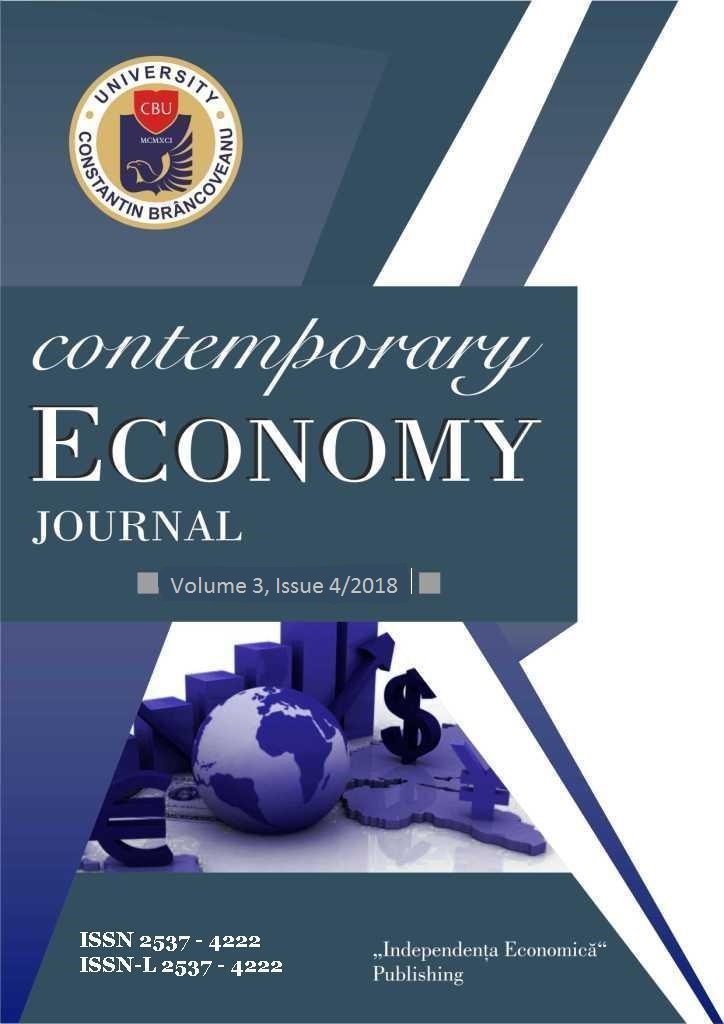
The innovation capacity (potential) is a necessary feature of any dissipative systems. In the case of organizations that must maintain their structure and the correlative functions, i.e., must verify the state of sustainability, this feature is much more important. The paper examines the role of the innovation regarding especially the institutional innovation in generating and preserving the sustainable state and kinematics of organizations considered in the most abstract way: dissipative systems „endowed” with human beings. Some conceptual clarifications are delivered in order to prepare the considerations on the main mechanisms aimed to react to the external or internal perturbations on the sustainability of the organizations in case. The paper goes beyond the simple resilience or robustness, by convoking some new and still polemical concepts: auto-poiesis, anti-fragility, Oedipus effect and so on. Finally, a logical map of emerging auto-poiesis in organizations are sketched.
More...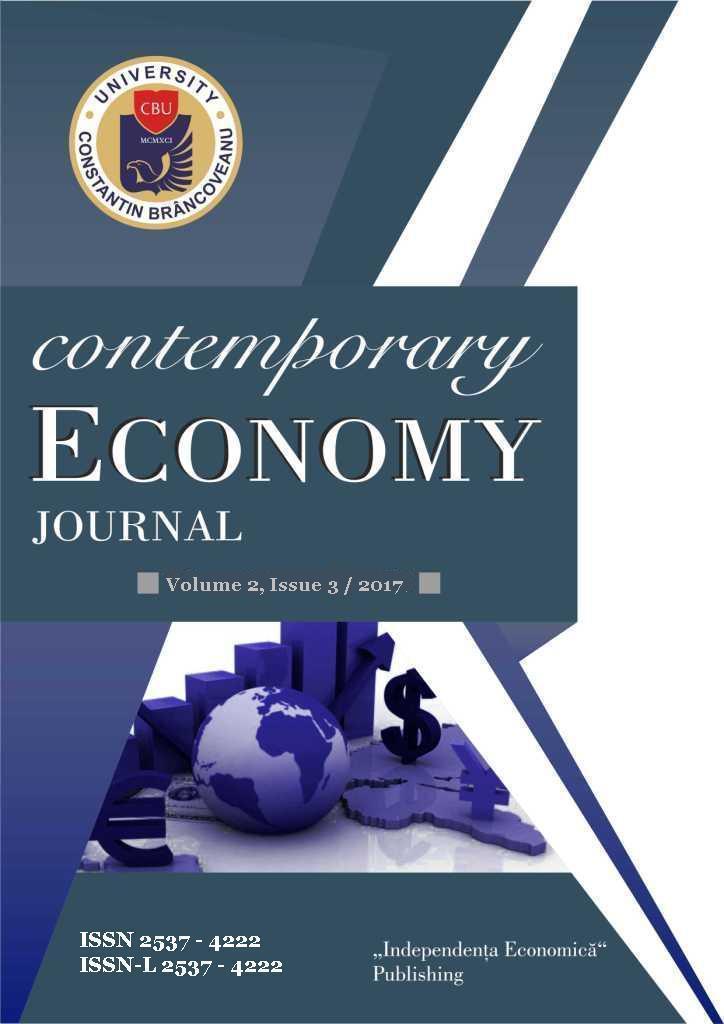
Starting from the various definitions of microfinance in terms of epistemological given by the best specialists of our century and together with my views concerning the species microfinance through this paper will define finance as one general and microfinance for local communities as a species of funding. Regarding to the sociological aspects if we were to transpose the essential features mentioned by Peter Berger (1963) that: to "see the general in particular" and the ability "to see what is unusual in the familiar" I can say that microfinance is a species an overall financing. In the microfinance approach is bottom-up social change of the challenge in the current context of social and financial inclusion: give money directly to small entrepreneurs who want to start the business on. A great father of microfinance is Muhammad Yunus, Nobel laureate in 2006, which contributed actively and directly in the development of microfinance mechanisms. We are currently witnessing such initiatives around the world with very surprisingly good results in Africa and Asia, which currently contributes to financial inclusion and social policy at international level.
More...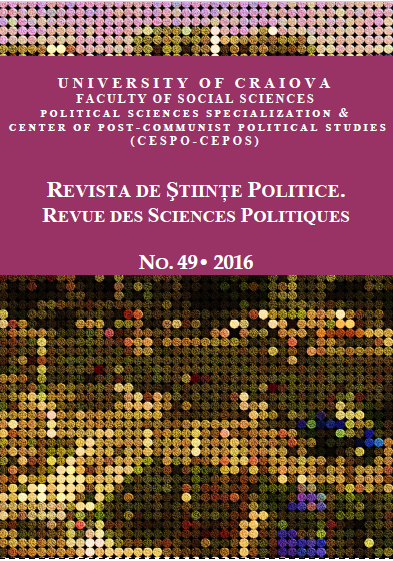
This study addresses the old problem of epistemological rupture between the micro and macro levels of scientific knowledge and critically analyzes the new proposals for reconciliation. At the same time, it is trying to answer questions like: is this methodological dualism a matter which limits scientific knowledge or it is rather an ideological dispute, in the broad sense of the term? Does it not rely on a founding duality and on a living dialectic between “the whole and the part”? The two levels of knowledge are not reciprocally exclusive and can “communicate” with each other and have even common analysis models.
More...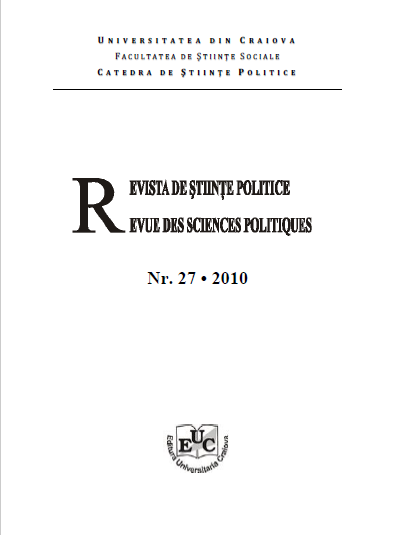
The article continues the measures undergone in issue 24/2009 and 25/2009 of this Revue, on the coordinates of manifestation of the general paradigm of post-modernity, with the approach of the philosophical-epistemological coordinate. One analyses Nietzsche’s heretical conception over philosophy (an avant la lettre postmodern man); the approaches of the representatives of the “second wave” of the logical anti-positivism, as an overture of logical postmodernism; the de-normativization of the discourse promoted by the French post-structuralism (mainly the one launched by Barthes 2, referring to the practice of writing); J. Derrida’s deconstructive project of grammatology, axed on the barthesian concept of writing.
More...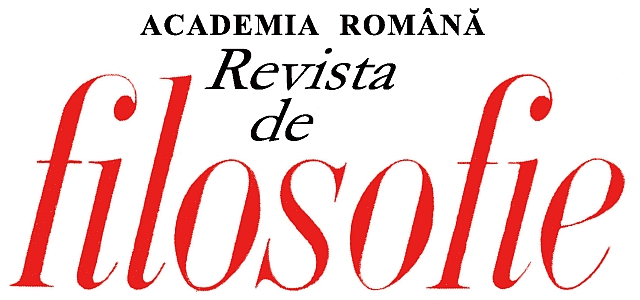
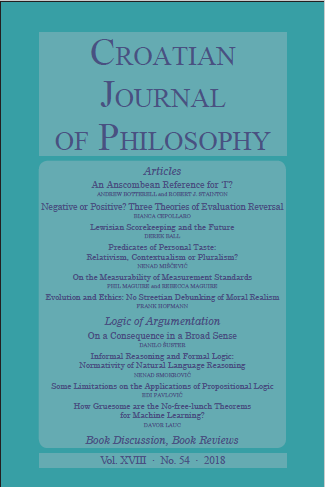
In this paper, I consider the phenomenon of evaluation reversal for two classes of evaluative terms that have received a great deal of attention in philosophy of language and linguistics: slurs and thick terms. I consider three approaches to analyze evaluation reversal: (i) lexical deflationist account, (ii) ambiguity account and (iii) echoic account. My purpose is mostly negative: my aim is to underline the shortcomings of these three strategies, in order to possibly pave the way for more suitable accounts.
More...
Cogency is the central normative concept of informal logic. But it is a loose evaluative concept and I argue that a generic notion covering all of the qualities of a well-reasoned argument is the most plausible conception. It is best captured by the standard RSA criterion: in a good argument acceptable (A) and relevant (R) premises provide sufficient (S) grounds for the conclusion. Logical qualities in a broad sense are affected by the epistemic qualities of the premises and “consequence” in a broad sense exhibits an interplay of form and content. There are four proposals for the premise—conclusion relation: (i) no strictly logical connection (“non-logical” consequence); (ii) one type of connection only (deductivism); (iii) a few types of connection (deduction, induction, perhaps conduction and analogical reasoning); (iv) many types of connection (argumentation schemes). Deductivism is a serious option but in its strong version, as the discussion about petitio shows, it fails to establish that arguments which are not cogent are thereby invalid. And weak deductivism, very attractive from the pedagogical point of view, has some deficiencies (implausible hidden premises; preservation of truth, not probability). I argue that the idea of a counterexample, when we regard certain components of the argument as fixed and others as variable, is the best approach to the analysis of the illative core of every-day arguments (the approach of David Hitchcock on material consequence).
More...
Dealing with deductive reasoning, performed by ‘real-life’ reasoners and expressed in natural language, the paper confronts Harman’s denying of normative relevance of logic to reasoning with a logicist thesis, a principle that is supposed to contribute for solving the problem of incongruence between descriptive nature of logic and normativity of reasoning. The paper discusses in detail John MacFarlane’s (2004) and Hartry Field’s (2009) variants of “bridge principle”. Taking both variants of bridge principles as its starting point, the paper proceeds arguing that there is more than one logical formalism that can be normatively suitable for deductive reasoning, due to the fact that reasoning can assume different forms that are guided by different goals. A particular reasoning processing can be modelled by specific formalism that can be shown to be actually used by a real human agent in a real reasoning context.
More...
Review of: MISLAV UZUNIĆ - Stuart Glennan, The New Mechanical Philosophy, New York: Oxford University Press, 2017, xi+266 pp.
More...
Pedagogical epistemology is an area of the philosophy of education. As pedagogical science (or science of education), pedagogical epistemology is methodologically built on the interdisciplinary relationship between pedagogy and philosophy. This education science builded interdisciplinary, has a general aim the analysis of the historical and theoretical fundamenting process of pedagogy as a socio-human science specialized in the study of education and training in the open framework of the system and the educational process. Fulfilling this general purpose requires the construction of an epistemological model. Such an epistemological model is the one promoted by Ştefan Bârsănescu, during two historical stages. At the stage of modern inter-war pedagogy (1936) and - through deepening and updating - in the stage of contemporary pedagogy (1976) - see "Unity of Contemporary Pedagogy as a Science", 1st Edition, 1936, 2nd Edition, 1976.The epistemological model proposed by Ştefan Bârsănescu highlights the necessary premises for the unitary construction of "pedagogical science", assured at the level of fundamental concepts, of "scientific style" and "research" system. Its realization involves the historical research of the evolution of the field and the reference to a necessary specific theory because "pedagogy suffers from the dictatorship of its word or more just from an anarchy of formulations that hold the place for ideas".The epistemological issue is referred to "two main questions": a) how was the specific research object of pedagogy designed ?; b) what is the methodology of research specific to pedagogy ? In this sense, "the use of the historical method in demonstrating of an epistemological problem" is welcome. With the help of it, the progress of pedagogy can be seen in its path "towards a true science of education".
More...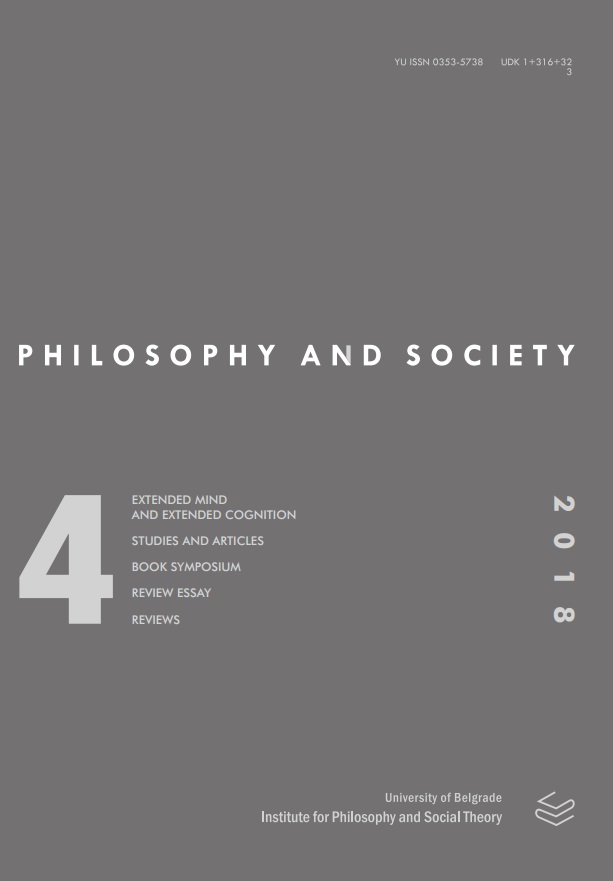
In this paper, I provide an argument for the assumption that contents supervene on vehicles, which is based on the explanatory role of representations in the cognitive sciences. I then show that the supervenience thesis together with the explanatory role imply that the individuation criteria for contents and vehicles are tightly bound together, such that content internalism (externalism) is in effect equivalent to vehicle internalism (externalism). In the remainder of the paper, I argue that some of the different positions in the debate stem from different research questions, namely the question about the acquisition conditions and the question about the entertaining conditions for mental representation. Finally, I argue that the thesis of externalism is much more interesting if understood as a claim about how mental representation works in our world as opposed to how they work in all metaphysically possible worlds. In particular, I argue that this “nomological” understanding of the thesis is able to explain how and why the experimental methods used in contemporary cognitive sciences are able to provide insight into behavior generation.
More...
A combination problem in Russelian panpsychism arises when we try to understand how macroexperience comes from microexperience. I will argue that panpsychists could avoid the combination problem if they endorse an intelligible form of emergence. They should endorse Shoemaker’s account of emergence or realization which states that there are “micro-latent” powers beside “micro-manifest” ones and accommodate this account to panpsychism. One possibility is that a macrosubject is part of a microsubject whole on Shoemaker’s “subset” account of realization. I will investigate if and how a possible solution to these panpsychist troubles could be distilled from Shoemnaker’s emergence account.
More...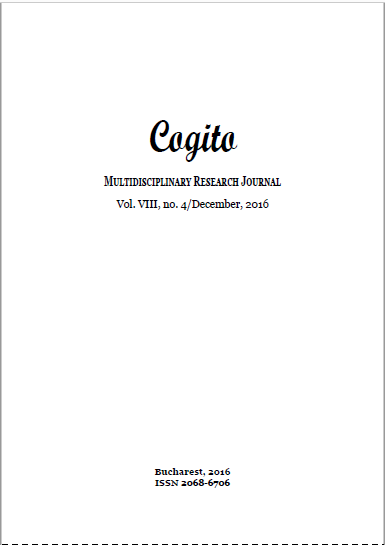
The ideal of full knowledge implies hazardous assumptions in relation to rigorousness and testability, based on the belief that the universe is, in its intimate structure, rational and intelligible. It is postulated, therefore, that there is a fundamental/full agreement between the essence of outer reality and thinking. Through the myth/mythicization of full rationality, existence assigns a meaning, a finality, and, consequently, a sense to human life, from naïveoptimistic standpoints. It is believed, here, that everything - the world and humankind - has a clear-cut sense. By default, it is accepted that the cultural act is necessary, being perceived as a mere extension of biology, its enrichment and deepening; human relations with the world are unproblematic, implying a familiarity with the surroundings, which satisfies the human need for inner security and, implicitly, for the instinct of self-preservation.
More...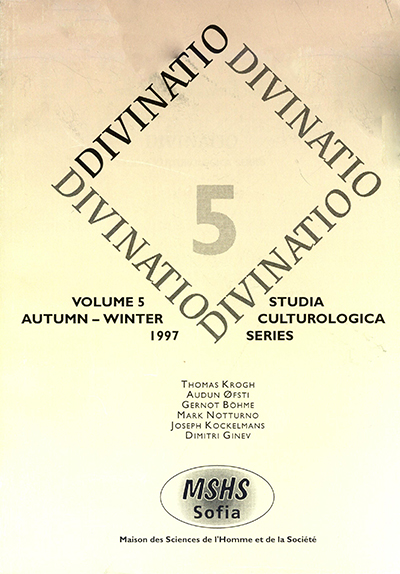
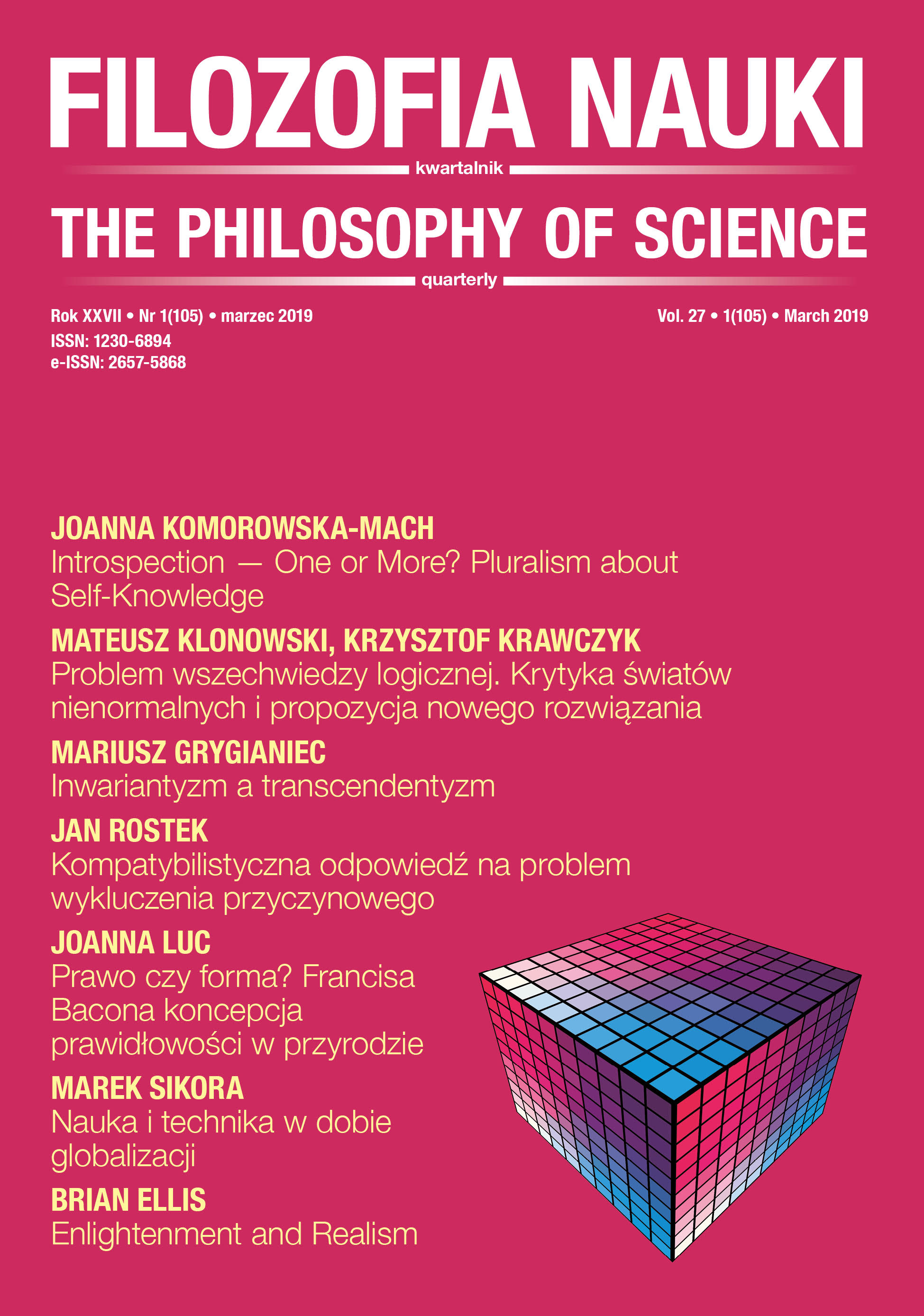
The aim of this paper is to provide a metaphilosophical analysis of the debate between monistic and pluralistic approaches to self-knowledge. I start by presenting the background for the discussion, clarifying the terminology, and drawing a distinction between moderate and radical pluralism. I then discuss and evaluate arguments for monism that appeal to general methodological guidelines as well as those relying on specific assumptions about the objects and character of selfknowledge. I offer a separate analysis of Eric Schwitzgebel’s radical pluralism, which threatens to undermine both monism and moderate pluralism. I close by describing a way of looking at the problem of the homogeneity of self-knowledge that goes beyond the monism–pluralism dichotomy and arguing that the heterogeneity and multidimensionality of the problem of self-knowledge are more important than the plurality of the solutions.
More...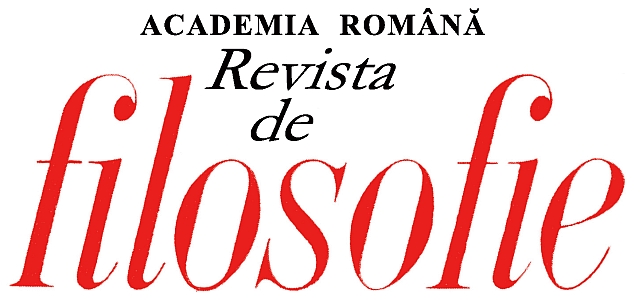
Theaim of our paper is to offer a historical sketch of the beginnings of strict finitism,especially from the point of view of its many philosophical aspects. A major hypothesisof our approach is that this presentation could be better done if we have in mind as anecessary background the intuitionistic, and broadly speaking constructivist mathematicalissues, also in a historical dimension. As a result, apart from some brief generalremarks, we will give here an insight mainly into the texts of some pioneering works inthis field of Paul Bernays, Émile Borel and David van Dantzig and into some importantconnections with Brouwer’s intuitionism.
More...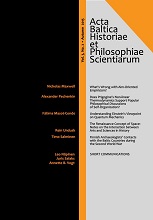
The article is concerned with the philosophical talks which became popular in the 1980s and have kept their popularity till now–the philosophical essays about self-organization. The author attempts to find out as to which extent are these essays founded on the scientific theory to which they regularly refer, that is, Ilya Prigogine’s non-linear thermodynamics. The author insists that the equivalent of self-organization in Prigogine’s theoretical physics is the concept of dissipative structure. The concept of selforganization, as it is used in philosophical literature, presupposes a sequence of extrapolations, the first extrapolation being conducted by Prigogine and his coauthors. They became to use the concept of dissipative structure beyond the rigorous theory of this phenomenon. The subsequent step was that the scientific term “dissipative structure” was replaced by the vague concept “self-organization” in many popular and semi-popular books and papers. The author also emphasizes that by placing the concept of self-organization into the framework of philosophical concepts (the picture of the world, the ideals of scientific thought, the contemporary scientific revolution, etc.) a philosopher conducts the extrapolation of extrapolation and comes to a kind of what Edmund Husserl called Weltanschauung (‘worldview’) philosophy.
More...